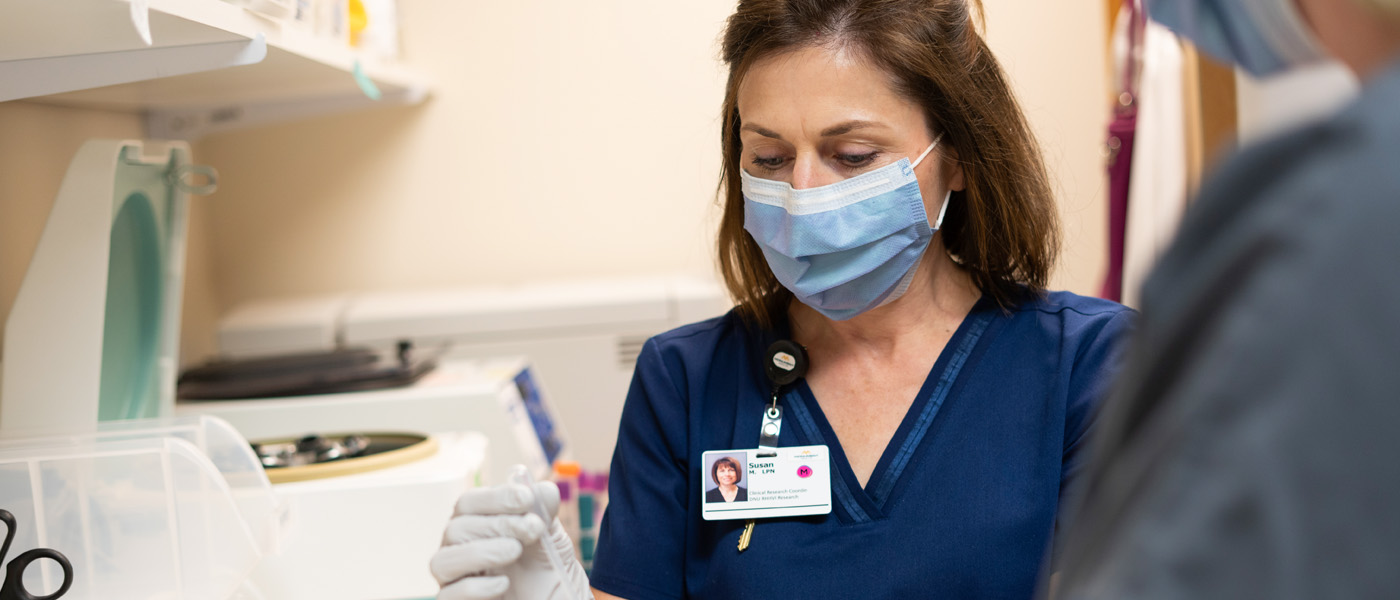New medications, updated medical equipment and the latest in treatment techniques don’t emerge out of the blue. It takes clinical research to perfect them.
Often when we think of the latest medical advancements, we imagine them emanating from metropolitan areas with prominent medical schools. What many fail to consider, is the role that clinical research plays in developing new medicines and treatments. Most people don’t know that Monument Health has an active clinical research team that partners with physicians to conduct clinical research right here in the Black Hills.
The clinical research conducted at Monument Health focuses on the use of new medications, new uses for existing medications, as well as new devices and therapies. Roger DeRaad, Director of Research, said that sometimes physicians will bring a trial to their attention if there is a new device or medication that they’re interested in working with or that they believe will help one of their patients. “Other times, research sponsors come to Monument Health to see if there is any interest in the studies, especially if they’ve worked with us in the past,” explained DeRaad.
The research studies are vital to developing new treatments, but they only work when there are participants. “Patients involved in clinical research are always volunteers,” said Crystal Gruetzmacher, Clinical Research Coordinator. “They give up their time — sometimes a good deal of time — and even though these trials are largely safe, the patients do assume some risk.”
Clinical research, trials and studies are necessary to develop new medicines, treatments, equipment and protocols that can save and drastically improve lives. But clinical research also benefits the Black Hills community in ways that may not be obvious at first glance.
“It’s important to understand that the only way that new medications can become available to everyone is if there are enough volunteers to participate in these studies,” adds DeRaad. “Improvements in treatments and medications depend on clinical research and the patients that participate in them.”
“Whether they realize it or not, the patients who volunteer for these studies are changing and even saving lives,” adds Kelli McIntosh, Manager of Research.
Once the treatments and medications do become widely available, Monument Health physicians are already ahead of the learning curve, since they will have had previous experience with them.
“Sometimes you’ll see physicians shy away from new treatments or medications, simply because they don’t have experience with them yet,” says DeRaad. “That isn’t the case here. By the time many new medications are approved, our doctors aren’t just learning about them, they’ve already had five or even ten years of experience with them from participating in studies. New treatments are adopted into practice more rapidly and it keeps our physicians on the cutting edge of therapies.”
Are there any risks?
A lot of people may wonder if there’s any risk in participating in a clinical study. While there is a modicum of risk involved in any clinical trial, safety measures are built into the studies to mitigate any potential problems. “We know we need to be careful so, for example, in early phase studies with a new medication, there will be frequent contact and frequent lab work to identify any unexpected changes,” said DeRaad. “Sometimes during a trial, we’ll learn something new, and it may necessitate changing how often we treat or examine patients. And of course, we always explain the risks as we go along and ask if they wish to continue participating.”
Monument Health Clinical Research is always seeking participants in studies, but it’s important to remember that this isn’t a walk-in clinic. Participants must meet specific requirements for each study, and if you’re already a Monument Health patient, chances are your provider will let you know if there’s a study that’s right for you.
The result of research
The long term impact of the studies is incredibly significant. “When we started 25 years ago we didn’t do stents in carotid arteries and we’ve kind of led the way in peripheral arterial stenting here,” DeRaad said. “About 20 years ago we went through numerous antiplatelet studies and now we have multiple effective anti-platelet therapies. We did the same thing with anticoagulation therapy. We went through 10 years of testing multiple anticoagulants and now we’ve got a wonderful array of anticoagulants.” Presently, two thirds of the research is cardiac related, and there is a big focus on a vast array of anti-cholesterol, lipid lowering drugs.
“We’re always learning new things, and we’re always excited for Monument Health to take part in new research,” said McIntosh. DeRaad adds, “About once a month we get notified of a new study that’s interesting, intriguing and challenging. There’s always something new — and potentially life-altering — just around the bend.

